- Essay Topic Generator
- Summary Generator
- Thesis Maker Academic
- Sentence Rephraser
- Read My Paper
- Hypothesis Generator
- Cover Page Generator
- Text Compactor
- Essay Scrambler
- Essay Plagiarism Checker
- Hook Generator
- AI Writing Checker
- Notes Maker
- Overnight Essay Writing
- Topic Ideas
- Writing Tips
- Essay Writing (by Genre)
- Essay Writing (by Topic)

8th Grade Essay: Examples, Topics, & Writing Tips

If you find yourself on this page, you are probably going to another level of your education – the final year of Middle school!
Isn’t it exciting?
One of the most common assignments in the 8th grade is an essay. Indeed, it gains new features. An eighth-grade essay is not the same as the sixth or seventh-grade one. It has more requirements and needs a deeper level of analysis.
How to write an 8th-grade essay? How many paragraphs should it contain? What is a standard 8th-grade essay format? On this page, you’ll find the answers to these and other questions that might arise. We’ve prepared creative 8th-grade essay topics, examples, and tips to write an A+ informative, narrative, or persuasive essay.
- 🧩 8th Grade Essay 101
- 📑 8th-Grade Essay Types
- 💾 Topics for the 8 th -Graders
🍎 8th Grade Essay Examples
🧩 8th-grade essay format explained.
Once again: the 8th-grade essay format is a bit different from that of the previous years.
Below, we thoroughly explain how long an 8th-grade essay should be and how to write it. We guarantee you’ll have no questions about the format and assessment of this type of work.
What Is the 8 th Grade Essay Format?
In this section, you’ll know which parts comprise any 8th-grade essay.
The first thing to remember: you’ve got onto an entirely new level. So, your writing isn’t as simple and short as it used to be in the previous school years.
Let’s start with the structure. The fundamental parts are the same as in any type of essay:

8th Grade Essay: How to Write & Typical Mistakes
With the help of this section, you’ll get to know the most straightforward and helpful tips for 8th-grade essay writing.
These are the things that any 8th grader should know!
8 th Grade Essay Do’s
- Look for reliable sources to find arguments and evidence.
- Try to arouse eagerness for writing: it surely will ease the whole process for you.
- Choose the topic that is interesting for you if you have such an option.
- Use academic language, special terms, consistent phrases, and correct grammar.
- Use good quotations from reputable sources to solidify your ideas.
8 th Grade Essay Don’ts
- Don’t write dully: an essay is a story. It should be exciting and consistent.
- Don’t make all your examples too similar: diversity is of the essence.
- Don’t let your text look like an unreadable pile of words: use graphic tools to highlight the most critical points.
- Don’t use unreliable sources and websites for citation.
- Don’t be afraid of honest self-expression. Your identity and thoughts are what make your 8th-grade essay unique.
- Don’t forget to revise your text after you’ve finished writing it.
8th Grade Essay Rubric
Meet the assessment strategies for 8th-grade writing. Here you’ll also find some prompts that improve your essay and lead you to a higher score.
So, the assessment pattern of a written piece comprises several main points. These are the things that assessors pay attention to:
📑 Eighth Grade Essay Types
We suppose that you come across different types of assignments during middle school. Among them, there indeed were descriptive and narrative essays.
However, now you are to face other exciting formats of writing. In the section below, you’ll get to know a few new types.
8th Grade Argumentative Essay
An argumentative essay is a piece of writing where you make a claim and prove your point of view with solid arguments. Your aim at this point is to make readers nod in contempt while reading and share your opinion.
The structure may be pretty familiar to you:
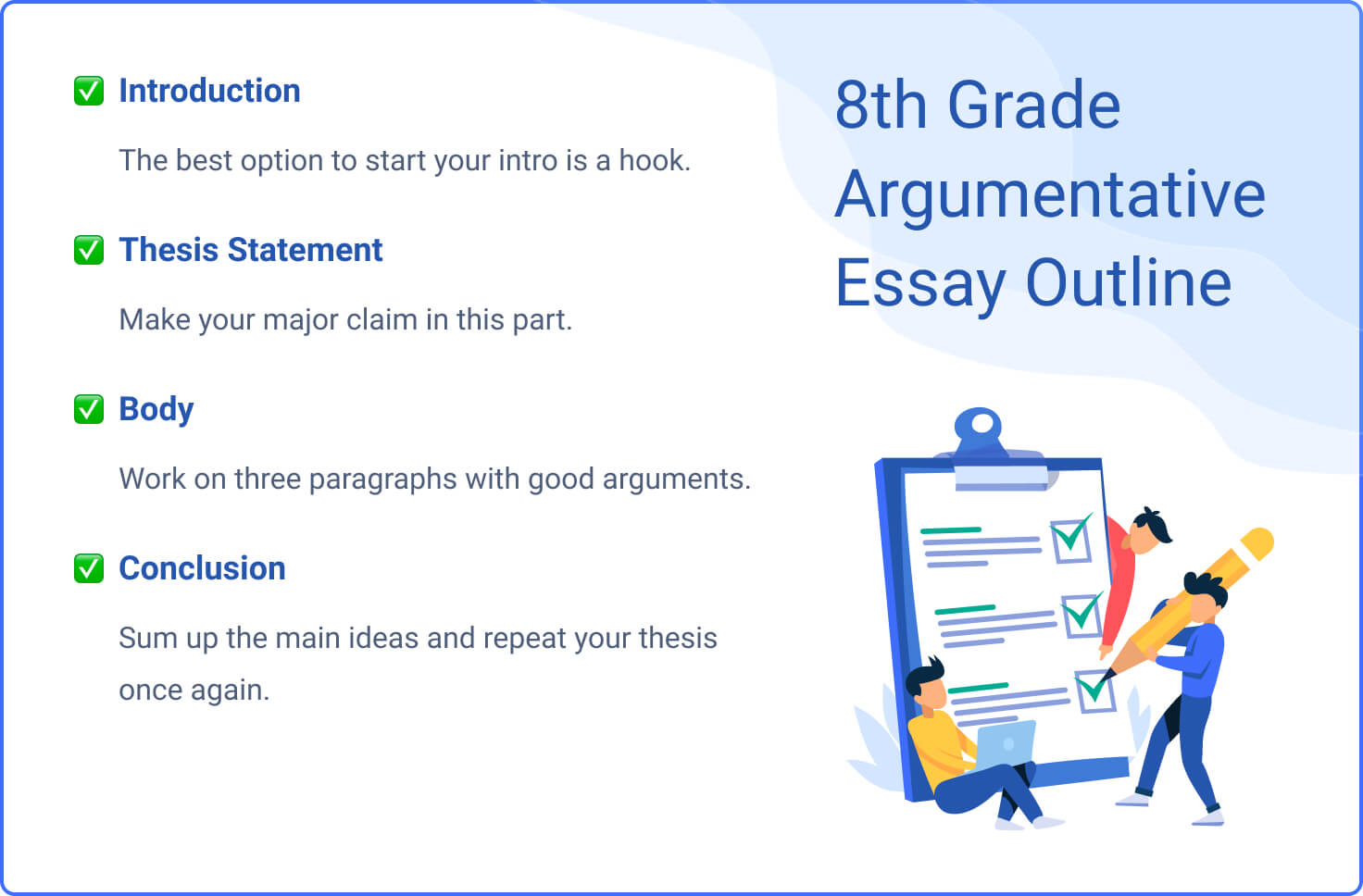
In your argumentative essay, you should back up your opinion with some exact data: statistics, figures, research studies, and polls.
To solidify your claim, you can use three types of arguments:
- Aristotelian . The classical way – you make a statement and try to persuade the audience that it is the one that is fair and right.
- Rogerian . First, you display an issue, then present the opposing view. After that, reveal your own opinion and start convincing readers why they should take up your point.
- Toulmin . Present your thesis statement, then provide the audience with the grounds to support it. The final touch is to connect these parts.
PRO TIP: Explain why you disagree with the opposing point of view on your issue.
8th Grade Persuasive Essay
A persuasive essay is very similar to argumentative writing. There you have to pick up a mainly burning issue and establish a firm opinion towards it. The primary goal is the same as in the argumentative essay: to make your readers believe you.
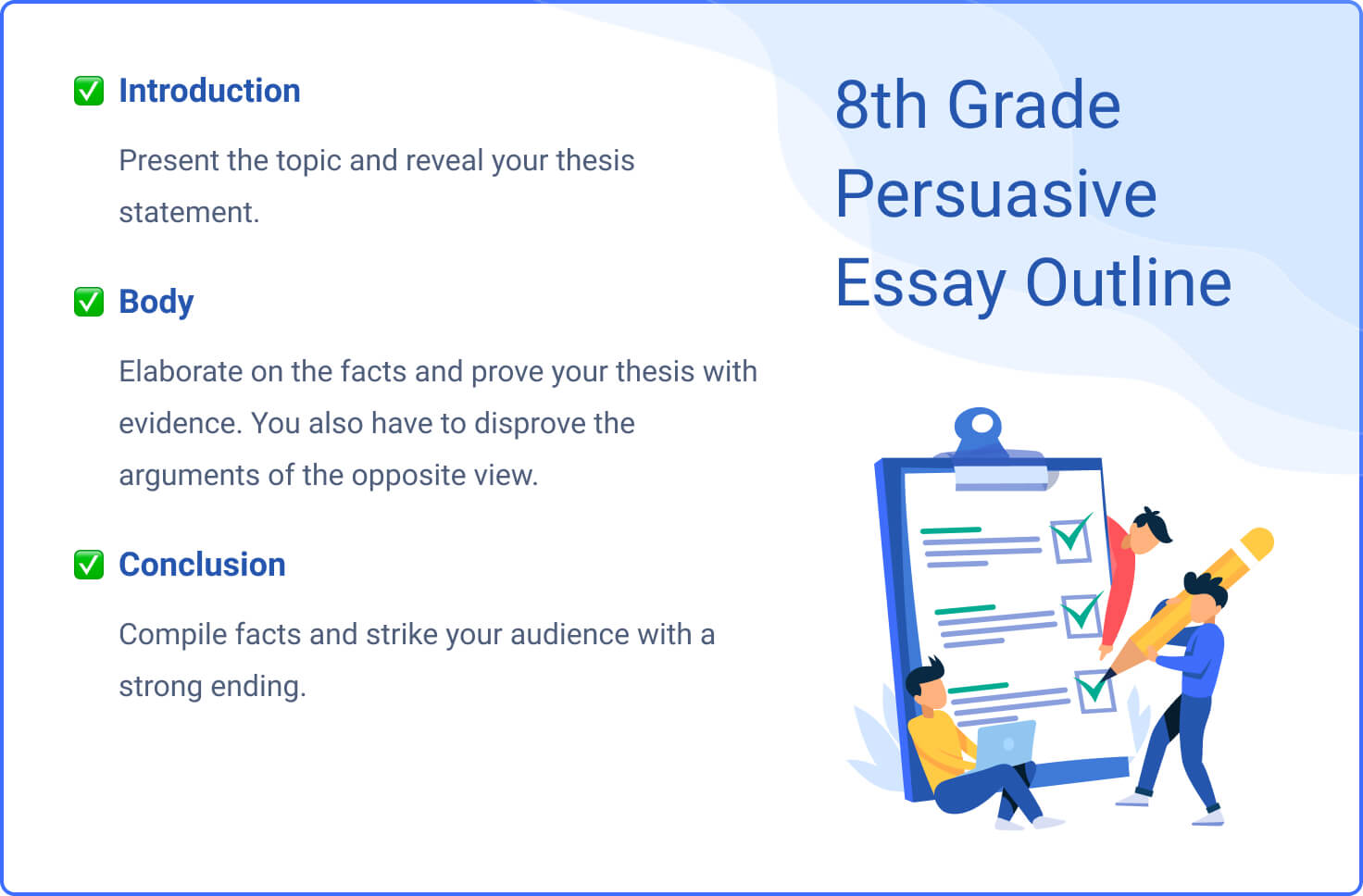
Remember the three essentials of persuasive writing:
- Logos appeals to logic, which is apparent. Deliver your thoughts cohesively and reasonably.
- Ethos is about persuading the readers, appealing to their sense of ethics and morality.
- Pathos helps you convince through emotions.
8th Grade Essay – Informative
An expository essay brings concepts to complete understanding. In other words, you explain something to give a clue about the subject in question. Successful expository writing makes the audience get the whole picture, leaving no questions or misunderstandings.
To familiarize yourself with expository essay structure, check our recently updated guide on writing an expository essay .
And briefly look at six major types of expository essays:
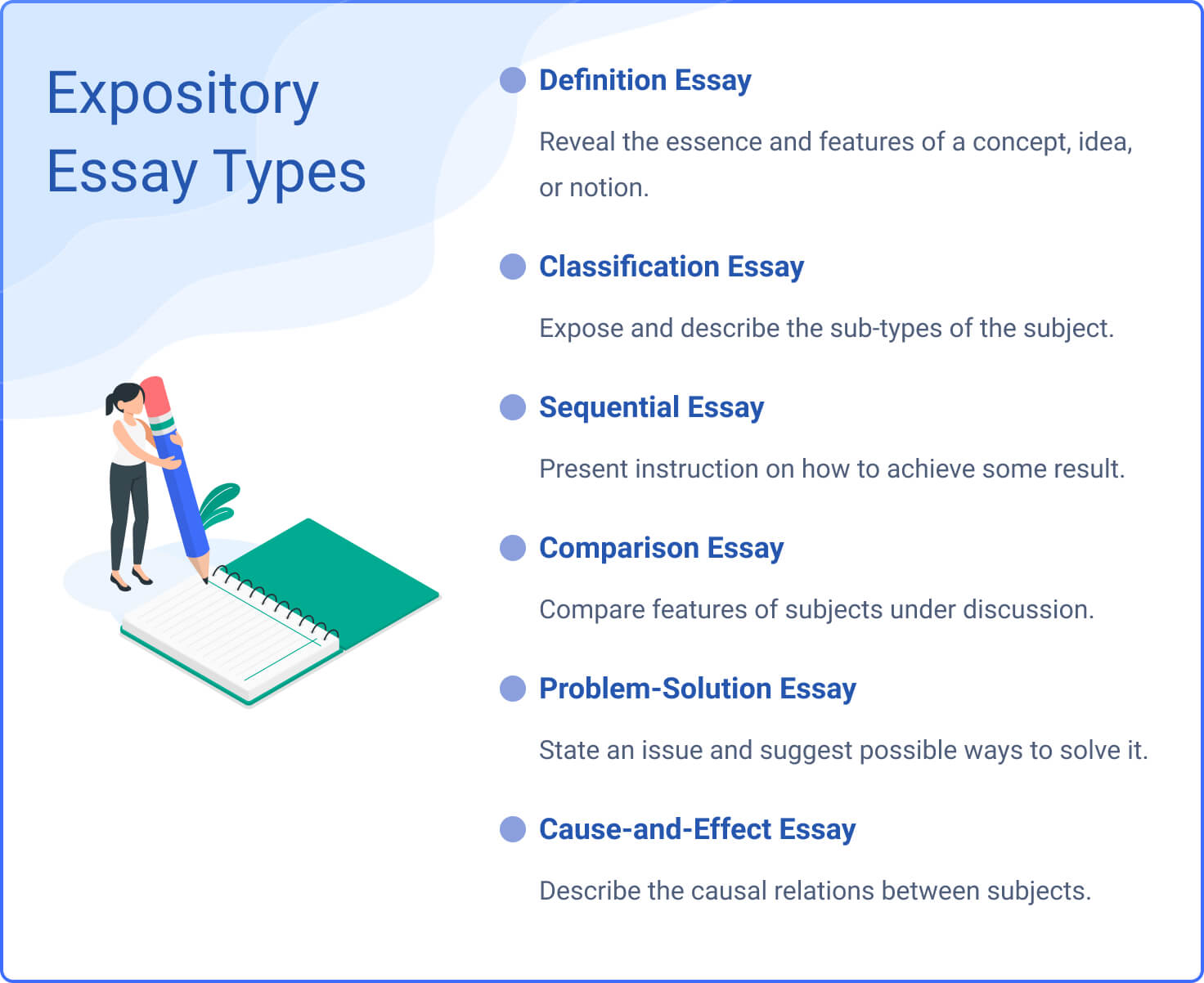
💾 8th Grade Essay Topics
8th grade argumentative essay topics.
- What is the main challenge you’ve ever met?
- What was the happiest moment of your childhood?
- Tell about the accomplishment you’re most proud of.
- What are the personal qualities you like most?
- Write about an inspiring celebrity.
- What does emotional intelligence mean?
- Write about the largest challenge of getting older.
- How is adolescence different from childhood?
Read the list of topics we’ve prepared for an 8th-grade essay. Choose your favorite or use our Free Essay Topics Generator to find the best one.
Persuasive Essay Topics for 8th Grade
- Would limited screen time be beneficial for health?
- Will the global use of electric vehicles save us from the ecological crisis?
- The government should provide citizens with more qualified psychological help.
- What are the pros and cons of buying a pet for a child?
- Should people use paper and textile bags instead of plastic ones?
- Is it necessary to attend PE classes in school?
- Is it ethical to use smartphones during the lesson?
- Should parents forbid their children from watching TikTok?
- Pros and cons of cheating on exams: immoral or beneficial?
- Should there be only healthy snack vending machines at schools?
- Is it acceptable for a teacher to raise the voice at a student?
- Should modern rappers’ songs be put through censorship?
- Is it ethical for students to discuss their teachers?
- Should all cosmetic products become cruelty-free?
- Should we stop the overconsumption of sugar for the sake of our health?
- Should zoos and circuses be banned forever?
8th Grade Informative Essay Topics
- Compare and contrast the environmental policies of the USA and Europe.
- What are the harmful effects of CO 2 emissions on the environment?
- How is the concept of freedom reflected in 20th-century literature?
- Reveal the details of the famous friendship of Hemingway and Fitzgerald.
- Brush off or fight: how to act when you come across bullying at school?
- What are the most significant challenges school attendees usually face?
- How to overcome your fears without getting traumatized?
- How to prepare for the exam period and overcome anxiety?
- Freedom or despair: the history and concept of trailer parks in the USA.
- Explain the concept of sustainability and what benefits it has.
- Provide a classification of American lifestyles based on location.
- A reasonable person: describe the concept and the features.
Look at our 8th grade essay examples. These are mostly just excerpts, but we included the most significant parts. Approach us in case you need a similar paper or have any questions.
8th Grade Argumentative Essay Example (#1)
The most notorious substance in the ecological discourse: is CO 2 really that bad?
Did you know that it’s better for the earth if you work out or jog with your mouth tightly shut? It’s not common knowledge, but professionals know: we need a considerable amount of CO 2 in our blood. In some terms, it’s even more vital than oxygen. Undoubtedly, there has to be a proper balance, and here is the point: CO 2 can be beneficial.
Though what good does it make to nature and the environment?
It’s all the same as with our body: CO 2 is not evil on earth, but there must be a proper balance. Now, this balance is critical, and we must make serious efforts to change the situation.
- According to last year’s research, the USA is in the second place among countries producing the most significant part of CO 2 in the whole world. The website statista.com published striking figures. 4.57 million metric tons of carbon dioxide emissions were produced in 2020 by the energy consumption sphere in the United States.
- Besides, a recently published report from the IEA agency reveals another piece of statistics. Compared to the previous year, the amount of CO 2 emissions will rise to 5% in 2021. This year we’re facing 33 billion tons of this greenhouse gas.
- These figures mean nothing without context. Here you are: nature suffers greatly from CO 2 influence. Due to the greenhouse effect caused by an excess of CO 2 , the water temperature in oceans and seas is rising. This process is not positive at all because the natural habitat for sea creatures is altering. The changes are dramatic and lead to the extinction of many species.
In conclusion, we need to find an efficient way to improve the ecological situation regarding CO 2 emissions. The key is global social and individual awareness and consciousness. Each and every inhabitant of the Earth has to understand the meaning of CO 2 for global warming clearly. So, try to jog with your lips closed and choose a bike instead of a car.
Example #2: 8th Grade Persuasive Essay
Is it essential to stay away from social media for the sake of mental health?
Nielsen Company conducted research that says that the average US adult spends more than 10 hours interacting with social media each day. Indeed, social media plays a very considerable role in the life of a modern person. Most of us are more likely to spend time watching short videos than reading a good book. But is it harmful to our mental health to the extent that we have to quit using social media platforms?
To my mind, we are greatly dependent on our Instagram and TikTok accounts, and the content posted there. It certainly has a negative impact, too. However, the complete cancellation of social media is not a way out. The key to good mental condition is in the skill of managing your relations with them.
- One of the recent surveys by the Lancet reports that Facebook users who scroll the newsfeed before sleep tend to be more depressed. Apparently, the deprivation of sleep affects mental well-being to a great extent.
- FInancesOnline has recently posted the results of the research. According to this data, Facebook constitutes 72% of people’s FOMO and anxiety. Posts about traveling and active social life create most of these feelings.
- At the same time, healthy rivalry can motivate development and growth. There’s a reasonable quotation saying that one should compare themselves yesterday instead of comparing to others. The best thing one can do to take care of their mental health is to take a digital detox for a while.
Thus, it is vital to trace your obsessions with social media and negative feelings caused by comparison with others on the Internet. Try to get more aware of it, take your time to rest from social media, and plunge into real life.
5 Paragraph Essay Example for 8th Grade (#3)
The Financier and American Tragedy : compare and contrast two main characters of Dreiser’s novels.
Do you know that Theodore Dreiser is sometimes called an American Fyodor Dostoevsky? Both writers touched upon the most sensitive social and existential issues. However, the subject of this paper is not the comparison of the authors but two famous Dreiser characters: Clyde Griffiths and Frank Cowperwood.
Both of these young American men were striving to reach financial and social success in a world of brutal struggle and hardships.
- Clyde Griffiths represents the desperate strive for American Dream. Born in a poor and religious family, he grows greedy for money and status. In his blind obsession with gaining a high social position, he doesn’t notice his spiritual degradation. He is smart enough to struggle his way into high society but not so witty to solidify his standing with decent means. He cheats, lies, and finally commits a murder: Clyde seems to be already born guilty at times. On reading the story, there doesn’t appear any sympathy toward him. On the contrary, he provokes feelings of abomination and disgust.
- Frank Cowperwood also aims to become wealthy and socially firm. He wants to improve his family’s life quality. Still, his ways and means astonish. Frank is a natural-born predator and strategist. His sophistication and sharp wit show up in him since his very childhood. He isn’t a man of high moral standards: Frank doesn’t mind cheating on his wife and manipulating city treasure money. However, he’s a passionate man, honest and open in his heart urges and impulses. That is the reason why fortune favors him.
However, having similar goals but different personalities and mindsets, Griffiths and Cowperwood reach completely different destination points.
How to Write an Essay in 8th Grade?
– You should pick up a good topic and formulate your attitude to the problem. – Write an outline. – Make a clear and brief thesis statement. – Think of at least 3 firm arguments if the essay type demands it. – Impress your readers with a firm conclusion. Voila! Do not forget to proofread!
How Long Is an Essay in 8th Grade?
The length of the 8th-grade essay slightly depends on the format and the particular type of writing. However, it varies from approximately 500 to 800 words. Within this framework, you have to make yourself clear and deliver all necessary points.
How Many Sentences Are in a Paragraph for 8th Grade?
The size of a paragraph in the 8th-grade essay has to be not less than 8 sentences in each. Besides that, mind that the sentences are primarily compound or complex, error-free, and coherent. Also, remember to connect the sentences and paragraphs with particular language means.
How to Write an Argumentative Essay in 8th Grade?
Choose an exciting and acute topic. Make up a thesis statement out of the problem. Draft an outline or a brief plan. Explore some reliable sources for the evidence and arguments for your essay. Organize the facts and information into a cohesive structure.
I’m an 8th grade student at a private school, and my teacher assigns us up to 4-6 pages most to write. First of all we get other essays on top of this, and usually have nearly to a week to finish. Me and my classmates struggle with this. Do you guys think this is too much for an average 8th grade student?
i am writin apaper right now and it is averreding and its about the changes we woud make to our cafeteria it has to be 5 paragraphs long
Thanks for stopping by at our blog. We would be happy to help you with your paper. You can be interested in some other posts on this blog (https://overnightessay.com/blog/category/essay-tips/) or contact our friendly Support Team to get professional writign help from experienced writers. Good luck with your paper! Best regards,
- Class 8 English Grammar Chapter 20 Essay Writing
Class 8 English Grammar Chapter 20 Essay Writing. An essay is a detailed piece of writing on a specific subject expressed in the required number of paragraphs. An essay usually has three parts: Introduction – This part of the essay must be short, to the point, neat and informative. Body – The body of an essay gives its reader a detailed account regarding the main theme of the essay, through a few paragraphs. This part of the essay needs to be detailed as well as inclusive, logically organized and well developed. Conclusion – This portion sums up the argument built through the body of the essay. Therefore, this must be convincing reasonable and impressive at the same time.
Grade 8 English Grammar Chapter 20 Essay Writing
- Class 8 English Grammar Chapter 20 Revision Book
- Class 8 English Grammar Previous Chapter
- Class 8 English Grammar Main Page
- Class 8 English NCERT Solutions
- Class 8 all Subjects Solutions
The realm of essay writing, as explored in Chapter 20 of Class 8 English Grammar, offers an enriching avenue for students to present their thoughts, arguments, and ideas in an organized and articulate manner. Renowned educational platforms like Tiwari Academy underscore the importance of essays, not only as an academic tool but also as a life skill that hones one’s ability to communicate effectively.
What exactly is an essay? It’s more than just a collection of words or a random assortment of ideas. An essay is a meticulously structured piece of writing that dives deep into a specific topic, providing readers with insights, arguments, and perspectives.
Essay 1 – A Picnic
- Introduction : Time, Place and Company: It was a fine day in March last. A cool breeze was blowing. Some of my friends and 1 decided to go on a picnic to a nearby lake. It was a pleasant morning. We were a party of ten friends. We collected 20 rupees each. We bought fruits, sweets and some other eatables. We took our bikes and started at 7 a.m. We reached there in half an hour. We selected a beautiful grassy spot. We spread the carpet and rested for some time. First of all we ate apples.
- What did we do? : Then we took off our clothes and jumped into the water. We swam, dived and played in the water. We came out of the water and put on our clothes. We soon felt hungry. We ate some fruits and sweets. We took tea. After taking tea ,we sat in a circle. We played cards. Mohan sang a song. Sohan played upon the flute. Ajit recited a poem. Ram told us a story. Manoj amused us with tit – bits. We laughed heartily. We sang and danced..
- Conclusion : We again bathed in the lake. We had a jolly good time there. It was evening by then. We left for our homes. It was a nice picnic. It was really a happy day of my life.
The anatomy of a compelling essay can be broken down into three core segments:
- Introduction : As the opening salvo, the introduction sets the stage for what’s to come. It’s essential to capture the reader’s attention right off the bat, making them eager to delve deeper. A well-crafted introduction is concise, intriguing, and provides a brief overview of the topic at hand.
- Body : This is where the magic truly unfolds. The body of the essay, often spread across several paragraphs, delves deep into the topic, weaving together facts, arguments, and opinions. Every paragraph should be a structured entity in itself, presenting a particular point or idea and substantiating it with evidence or examples. Consistency in flow, logical sequencing, and coherent development of ideas are vital to keep the reader engaged.
- Conclusion : As the curtain falls, the conclusion wraps up the discourse, encapsulating the essence of the essay. A compelling conclusion doesn’t just reiterate the points made but offers a fresh perspective or a thought-provoking statement, leaving a lasting impression on the reader.
Essay 1 – A Morning Walk
Introduction : A morning walk is a light exercise. It is very useful for health. It keeps us fresh and active the whole day. It makes us healthy and cheerful. Morning time is the best time of the day. It is calm and quiet. A cool breeze blows. The atmosphere is free from dust and smoke. There is a famous saying: “He, who walks a mile, will surely smile.”
Description : I am an early bird. Last Sunday, I got up at 4 O’clock. I called on my friend, Manish. Both of us left for the canal. The birds were chirping, We saw many people on the way. They were also going for a walk. Farmers were going to their fields. Women were going to fetch water. They were singing beautiful songs. A cool breeze was blowing. The sky was clear. Green field fields looked beautiful. Dew-drops on the grass looked like pearls.
What we saw and did : We reached the canal in half an hour. We sat on the bank and took rest. We saw some persons bathing in the canal. Some were praying to God. Some were walking along thè bank. Some were swimming. We took exercise. We had our bath. We felt fresh. We put on our clothes. We started for our homes. A morning walk costs nothing but gains are many. We should never miss it.
Essay 1 – A Scene at the Bus Stand
Introduction : A bus stand presents a very lively and busy scene. It is like a musceum of human faces and fashion. Last Monday, I went to see off my friend at the bus stand. There was a great rush. Buses were departing and arriving. The bus for Delhi had not yet arrived. So we had to wait.
Description : There was a great rush of passengers. They were waiting for their buses. The ladies were sitting in groups. The children were playing here and there. Vendors and hawkers : Vendors and hawkers were selling news papers and eatables. They were shouting at the top of their voice. There was a rush at the water tap, the tea stalls and the book stalls. We went to a tea stall. We took tea. We bought two books to pass time.
Arrival and departure of the bus : There were long queues at the booking windows. Soon our bus arrived. I bought a ticket for my friend. He boarded the bus and got a seat near the window. The driver took his seat. The conductor gave a whistle and the bus started. I wished good-bye to my friend.
The journey of essay writing is both an art and a science, demanding creativity in expression and precision in structure. Chapter 20, as curated by leading educational institutions, empowers students with the techniques and nuances of essay writing, ensuring they are well-equipped to articulate their thoughts effectively for academic pursuits and beyond.
Essay 1 – My School
Name and Situation of the Building : I read in Tiwari Academy Sr. Sec. School, New Delhi. It is situated out side the town on the Bahadurgardh Highway. It has a very big building. It is in T shape. There are sixteen rooms and two big halls. All the rooms are airy, neat and clean. Each room has two fans. There is a library, two science rooms and a drawing – room. The staff room and the Principal’s office are well furnished. Garden and Play Grounds : In front of the school, there is a beautiful garden. It has flowerplants and fruit -trees. Sh. Ram Lai, the gardener of our school, looks after it. There are two big play grounds. We play games there daily. Our games teacher also plays with us. Teachers and Students : There are 50 teachers in our school. They are hard working. The school has 2000 students. All work hard. Our school shows good result every year. Sh. T.S. Chauhan is our Principal. He is an ideal Principal. The school is progressing under him. Our school is an ideal one. I am proud of it.
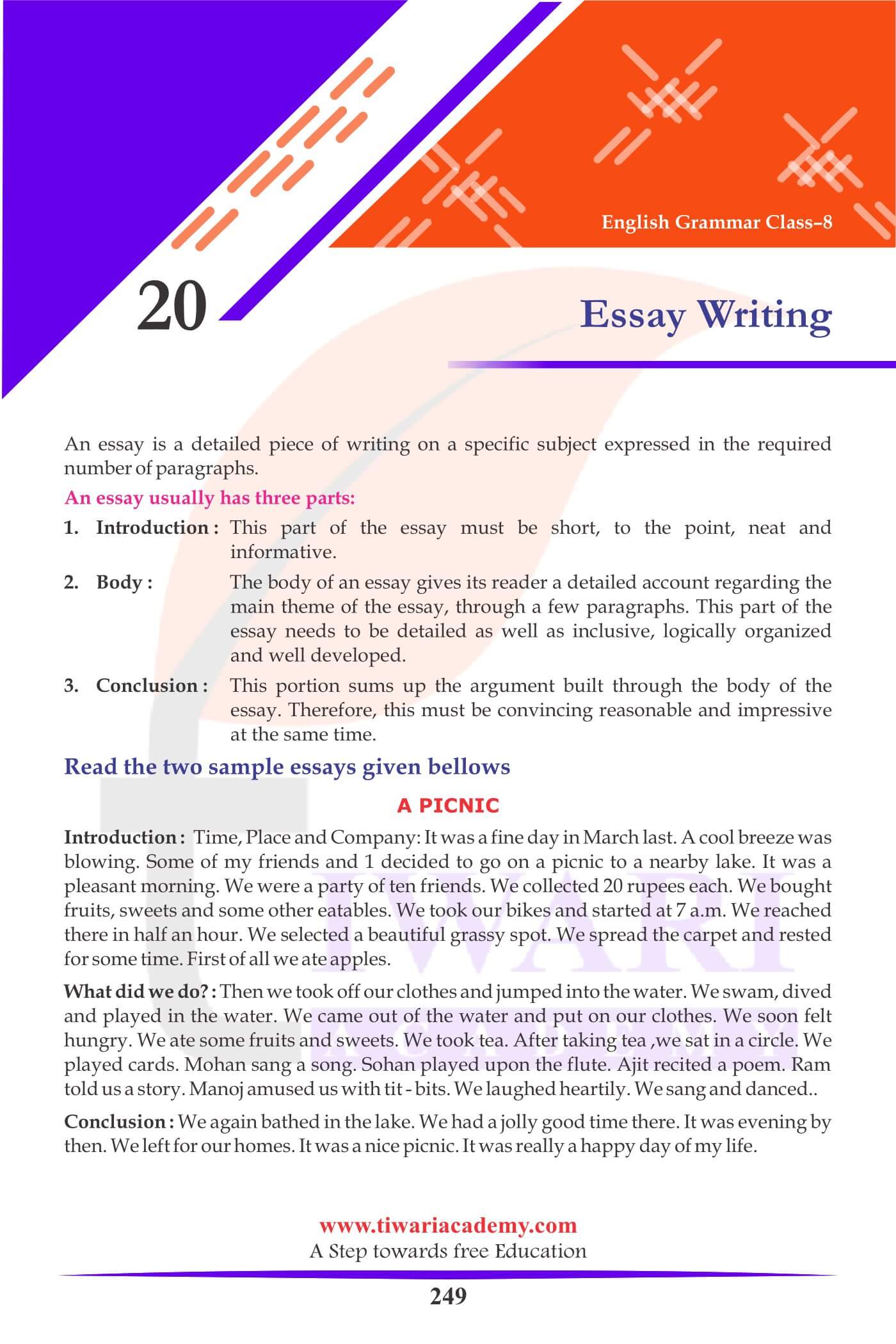
Copyright 2024 by Tiwari Academy | A step towards Free Education

Question and Answer forum for K12 Students

Essay Writing For Class 8 Format, Topics, Examples, Exercises
Essay writing for class 8 worksheet.
Essay writing is an essential skill that students must develop to succeed academically. It is a form of writing that requires students to express their ideas and thoughts on a particular topic in a clear and concise manner. Class 8 is a crucial year for students as they begin to learn more complex writing skills, including essay writing.
In this article, the focus will be on essay writing for Class 8 students. The article will provide an overview of the different types of essays, including narrative, English Grammar , and descriptive essays. It will also discuss the importance of coherence of ideas, grammar, and spelling when writing an essay.
Furthermore, the article will provide a list of essay writing topics for Class 8 students to aid in their practice sessions. These topics will be presented in simple language for students to read and understand on their own. By the end of this article, Class 8 students will have a better understanding of essay writing and be equipped with the necessary skills to write an effective essay.
Also Check: How To go about writing an essay
Understanding The Essay Topic
When writing an essay, understanding the topic is crucial. It is the foundation upon which the entire essay is built. Without a clear understanding of the topic, the essay will lack direction and coherence. In this section, we will discuss how to understand an essay topic and what steps to take to ensure that you are on the right track.
The first step in understanding an essay topic is to read it carefully. It is essential to pay attention to the wording of the topic and to note any key terms or phrases. These can provide valuable clues as to what the essay is asking for and what approach to take.
After reading the topic, it is important to brainstorm ideas. This involves jotting down any thoughts or ideas that come to mind, no matter how insignificant they may seem. Brainstorming can help to generate ideas and to narrow down the focus of the essay.
Once the ideas have been generated, it is time to organize them. This can be done by creating an outline, which can help to structure the essay and ensure that all the important points are covered. An outline can also help to identify any gaps in the argument and to ensure that the essay flows logically.
It is also important to consider the audience when writing an essay. Who is the essay aimed at, and what do they already know about the topic? This can help to determine the level of detail to include and the tone to use.
In summary, understanding the essay topic is essential for writing a successful essay. By carefully reading the topic, brainstorming ideas, organizing them, and considering the audience, the writer can ensure that the essay is well-structured, coherent, and relevant to the topic at hand.
Research and Gathering Information
When it comes to writing an essay, research, and gathering information are crucial steps that should not be overlooked. This section will cover two essential sub-sections of research and gathering information: Using Reliable Sources and Note Taking Techniques.
Using Reliable Sources
Using reliable sources is crucial when conducting research for an essay. Reliable sources are those that provide accurate, trustworthy, and unbiased information. Examples of reliable sources include academic journals, books, and reputable websites.
It is important to note that not all sources are created equal. Sources such as personal blogs, Wikipedia, and social media posts may not always be reliable. Therefore, it is essential to evaluate the credibility of sources before using them in an essay.
To evaluate the credibility of sources, one should consider the following factors:
- Authorship: Who wrote the source? Are they an expert in the field?
- Publication Date: How recent is the source? Is it up-to-date?
- Objectivity: Is the source biased? Does it present a balanced view?
- Evidence: Does the source provide evidence to support its claims?
Note Taking Techniques
Note-taking is an important part of the research process. Good note-taking techniques can help organize information and make it easier to write an essay.
One effective note-taking technique is to use a graphic organizer. A graphic organizer is a visual tool that helps organize information in a logical and structured manner. Examples of graphic organizers include mind maps, Venn diagrams, and flowcharts.
Another effective note-taking technique is to use bullet points. Bullet points are a concise and organized way to record information. They help break down complex information into smaller, more manageable pieces.
In conclusion, research and gathering information are essential steps in writing an essay. Using reliable sources and effective note-taking techniques can help make the research process more efficient and organized.
Essay Structure
When it comes to writing an essay, it is important to have a clear structure in mind. This not only helps the writer to organize their thoughts and ideas but also makes it easier for the reader to follow along. The basic structure of an essay consists of three main parts: the introduction, the body, and the conclusion.
Introduction
The introduction is the opening paragraph of the essay and serves as a way to grab the reader’s attention and provide some background information on the topic. It should include a thesis statement, which is a sentence or two that summarizes the main point or argument of the essay.
The body of the essay is where the writer presents their main arguments and supporting evidence. It is important to organize the body of the essay in a logical and coherent manner, with each paragraph focusing on a specific point or idea. One effective way to do this is to use subheadings or bullet points to break up the text and make it easier to read.
The conclusion is the final paragraph of the essay and should summarize the main points and restate the thesis statement in a new way. It is also a good idea to leave the reader with a final thought or question to encourage further reflection on the topic.
Overall, a well-structured essay is essential for conveying ideas and arguments clearly and effectively. By following the basic structure of an introduction, body, and conclusion, writers can ensure that their essays are organized, coherent, and easy to follow.

Drafting the Essay
Drafting is a crucial step in essay writing. It is the process of developing a complete first version of a piece of writing. Here are some tips for drafting an essay for Class 8:
Writing the Introduction
The introduction is the first part of the essay that the reader will see. It should be short, to the point, neat, and informative. The introduction should grab the reader’s attention and provide a clear idea of what the essay is about. One way to do this is to start with a hook, such as a surprising fact or a thought-provoking question. The introduction should also include a thesis statement that clearly states the main point of the essay.
Developing the Body
The body of the essay is where the writer presents their arguments and evidence to support the thesis statement. Each paragraph in the body should focus on a single idea or argument and should be well-organized. The writer should use transition words and phrases to connect the paragraphs and make the essay flow smoothly. It is also essential to provide evidence to support each argument, such as examples, statistics, or quotes from experts.
Concluding the Essay
The conclusion is the final part of the essay, where the writer summarizes the main points and restates the thesis statement. The conclusion should not introduce any new ideas but should provide a sense of closure to the essay. One way to do this is to end with a memorable statement or a call to action. The writer should also proofread the essay to check for any spelling or grammar errors.
In conclusion, drafting is an essential step in essay writing, and it requires careful planning and organization. By following these tips, students can improve their essay-writing skills and produce high-quality essays.
Revision and Proofreading
Revision and proofreading are essential steps in the essay writing process. These steps allow the writer to make necessary changes to their work, ensuring that the final product is error-free and of high quality. In this section, we will discuss the importance of revision and proofreading, and provide tips on how to effectively execute these steps.
Self-Review
Self-review is the process of reviewing one’s own work. This step is crucial because it allows the writer to identify areas that need improvement. When revising their work, the writer should consider the following:
- Content: Does the essay address the topic? Is the thesis statement clear and concise? Are the supporting arguments relevant?
- Structure: Are the paragraphs organized logically? Does the essay have a clear introduction, body, and conclusion?
- Language: Is the language used appropriate for the target audience? Are there any grammatical errors? Are the sentences clear and concise?
Peer Review
Peer review is the process of having someone else review one’s work. This step is beneficial because it allows the writer to receive feedback from another perspective. When seeking feedback from a peer, the writer should consider the following:
- Ask for specific feedback: Ask the peer to focus on specific aspects of the essay, such as the thesis statement or the organization of the paragraphs.
- Be open to criticism: Accept constructive criticism and use it to improve the essay.
- Consider the peer’s perspective: Consider the peer’s perspective and use it to improve the essay’s clarity and relevance.
In conclusion, revision and proofreading are essential steps in the essay writing process. By following the tips provided in this section, writers can ensure that their essays are error-free and of high quality.
Recommended Reading: Essay Writing For Class 8
Essay Presentation
When it comes to presenting an essay, there are certain guidelines that need to be followed in order to ensure that the essay is presented in a clear and professional manner. This section will cover the formatting guidelines, referencing, and citation for essay writing for Class 8.
Formatting Guidelines
The formatting guidelines for essay writing for Class 8 are as follows:
- Use a standard font such as Times New Roman or Arial, with a font size of 12.
- Use double spacing throughout the essay.
- Include a header on each page with the student’s name, the title of the essay, and the page number.
- Use one-inch margins on all sides of the page.
- Use headings and subheadings to organize the essay and make it easier to read.
Referencing
Referencing is an important part of essay writing, as it gives credit to the sources used in the essay. When referencing sources, the following guidelines should be followed:
- Use in-text citations to indicate where information was obtained.
- Include a reference list at the end of the essay, listing all sources used.
- Use a recognized referencing style, such as APA or MLA.
Citation is another important part of essay writing. When citing sources, the following guidelines should be followed:
- Use quotation marks to indicate direct quotes.
- Paraphrase information obtained from sources, using one’s own words.
Overall, following these guidelines will ensure that the essay is presented in a clear and professional manner and that the sources used are properly credited.

- Online Calculus Tutors
- Online Geometry Tutors
- Online Algebra Tutors
- Online Trigonometry Tutors
- Online Statistics Tutors
- Online Chemistry Tutors
- Online Macroeconomics Tutors
- Online English Tutors
- Online Physics Tutors
- Online Computer Science Tutors
- Online Accounting Tutors
- Online Biology Tutors
- Online Business Studies Tutors
- Online Finance Tutors
- Online Programming Tutors
- Online Management Tutors
- Online Science Tutors
- Year 2 Maths
- Year 3 Maths
- Year 4 Maths
- Year 5 Maths
- Year 6 Maths
- Year 2 English
- Year 3 English
- Year 4 English
- Year 5 English
- Year 6 English
- Year 7 Maths
- Year 8 Maths
- Year 9 Maths
- Year 10 Maths
- Year 10 Advance Maths
- Year 7 English
- Year 8 English
- Year 9 English
- Year 10 English
- Year 11 General Maths
- Year 11 Chemistry SA,NT
- Year 11 General Mathematics VIC
- Year 11 Mathematical Methods
- Year 11 Mathematics Standard
- Year 11 Chemistry ACT
- Year 11 Mathematics Extension 1
- Year 11 Mathematical Methods SA, NT
- Year 11 Mathematical Methods VIC
- Year 11 Mathematical Applications
- Year 11 Chemistry QLD
- Year 11 Literature ATAR
- Year 11 English - QLD
- Year 11 English Advanced NSW
- Year 11 EALD Level 3
- Year 11 English Language
- Year 11 Essential English M
- Year 11 Essential Skills TAS
- Year 11 Essential English
- Year 11 Bridging EAL
- Year 11 EALD Level 1
- Year 11 Stage 1 Essential English
- Year 11 English General
- Year 11 Mathematics Advanced
- Year 11 EAL
- Year 11 English Standard
- Year 11 EALD ATAR
- Year 12 Mathematics Standard
- Year 12 Further Mathematics
- Year 12 Mathematics Applications
- Year 12 Mathematics Extension 1
- Year 12 Mathematics Methods
- Year 12 Mathematics Advanced
- Year 12 Mathematics Methods VIC
- Year 12 Mathematics Methods - TAS
- Year 12 General Mathematics TAS
- Year 11 English T
- Year 12 Mathematical Methods - QLD
- Year 12 General Mathematics SA, NT
- Year 11 Foundation English
- Year 11 English Studies
- Year 11 Literacy Short Course
- Year 11 English Preliminary
- Year 12 English ATAR
- Year 11 EAL/D
- Year 12 English Extension 2
- Year 12 EAL/D
- Year 12 EALD ATAR WA
- Year 12 English Foundation
- Year 12 English Extension 1
- Year 12 Literature
- Year 12 Stage 2 Essential English
- Year 12 English Literature ATAR
- Year 12 Stage 2 English
- Year 12 EALD Level 2 - TAS
- Year 12 English Advanced NSW
- Year 12 Chemistry VIC
- Year 12 English Language
- Year 12 English Literature T - ACT
- Year 12 English Foundation WA
- Year 12 English Standard NSW Learning Programs
- Year 11 Chemistry WA
- Year 11 Chemistry - VIC
- Year 12 Chemistry - QLD
- Year 12 Chemistry - TAS
- Year 12 Chemistry - WA
- Year 12 Chemistry - NSW
- Year 12 Chemistry - ACT
- Online Tutors in Sydney
- Online Tutors in Melbourne
- Online Tutors in Brisbane
- Online Tutors in Gold Coast
- Online Tutors in Perth
- Online Tutors in Canberra
- Online Tutors in Adelaide
- Online Tutors in Newcastle
- HSC Papers 2019
- HSC Papers 2018
- HSC Papers 2017
Book a Free Demo
Math Calculus Geometry Algebra Trigonometry Statistics Chemistry Economics Macroeconomics English Physics Computer Science Accounting Biology Business Studies Finance Programming Management Science Year 3 Year 4 Year 5 Year 6 Year 7 Year 8 Year 9 Year 10 Year 11 Year 12 College
Search Here
Recent posts.
- General Achievement Test Australia
- ESL vs English Tutoring – What Makes Them Different?
- Know the Grading System in Australia
- GED vs HiSET: All You Need To Know
- HSPT vs PSAT: Which One Is Beneficial For You?
- WordPress.org
- Documentation
- Support Forums
How to write a perfect essay
Need to write an essay? Does the assignment feel as big as climbing Mount Everest? Fear not. You’re up to the challenge! The following step-by step tips from the Nat Geo Kids Almanac will help you with this monumental task.
Sometimes the subject matter of your essay is assigned to you, sometimes it’s not. Either way, you have to decide what you want to say. Start by brainstorming some ideas, writing down any thoughts you have about the subject. Then read over everything you’ve come up with and consider which idea you think is the strongest. Ask yourself what you want to write about the most. Keep in mind the goal of your essay. Can you achieve the goal of the assignment with this topic? If so, you’re good to go.
WRITE A TOPIC SENTENCE
This is the main idea of your essay, a statement of your thoughts on the subject. Again, consider the goal of your essay. Think of the topic sentence as an introduction that tells your reader what the rest of your essay will be about.
OUTLINE YOUR IDEAS
Once you have a good topic sentence, you then need to support that main idea with more detailed information, facts, thoughts, and examples. These supporting points answer one question about your topic sentence—“Why?” This is where research and perhaps more brainstorming come in. Then organize these points in the way you think makes the most sense, probably in order of importance. Now you have an outline for your essay.
ON YOUR MARK, GET SET, WRITE!
Follow your outline, using each of your supporting points as the topic sentence of its own paragraph. Use descriptive words to get your ideas across to the reader. Go into detail, using specific information to tell your story or make your point. Stay on track, making sure that everything you include is somehow related to the main idea of your essay. Use transitions to make your writing flow.
Finish your essay with a conclusion that summarizes your entire essay and 5 restates your main idea.
PROOFREAD AND REVISE
Check for errors in spelling, capitalization, punctuation, and grammar. Look for ways to make your writing clear, understandable, and interesting. Use descriptive verbs, adjectives, or adverbs when possible. It also helps to have someone else read your work to point out things you might have missed. Then make the necessary corrections and changes in a second draft. Repeat this revision process once more to make your final draft as good as you can.
Download the pdf .
Homework help
Science lab, (ad) national geographic kids almanac.
- Terms of Use
- Privacy Policy
- Your California Privacy Rights
- Children's Online Privacy Policy
- Interest-Based Ads
- About Nielsen Measurement
- Do Not Sell My Info
- National Geographic
- National Geographic Education
- Shop Nat Geo
- Customer Service
- Manage Your Subscription
Copyright © 1996-2015 National Geographic Society Copyright © 2015-2024 National Geographic Partners, LLC. All rights reserved
8th grade writing
by: Hank Pellissier | Updated: February 12, 2024
Print article

Verbal has a double meaning for eighth grade writing: it refers to the oral presentations the kids will do and to this year’s focus on grammar — gerunds, participles, and infinitives.
Argument essays
Written in formal language, argument essays should start with an introduction that clearly presents the writer’s position and flows into a well-organized, research-backed argument that advocates for their position and argues against opposing claims. Your child’s writing should exhibit a profound understanding of the topic. Arguments should be logical and fueled by evidence from credible sources. Papers should end with a persuasive conclusion that summarizes the viewpoint and declares the topic resolved. Topics will vary, but you’ll often see teen issues such as: Are video games harmful to mental health? Should our school have uniforms? Should bullies be suspended or given a chance to make amends?

Informative and explanatory writing
In their informative and explanatory papers , students use formal language to explain complex topics with relevant data, precise ideas, and logical analyses. Kids should start with an intriguing introduction that previews the subject matter. Next, they present well-organized information that’s backed by evidence from credible sources. Eighth graders should use a variety of “strategy tools,” including:
- Classifying information.
- Defining terms.
- Using subject-specific, academic , and transition vocabulary words.
- Quoting sources.
- Incorporating factual details.
- Making comparisons.
- Contrasting different situations.
- Explaining cause-and-effect relationships.
- Including graphics (charts, tables, images) and multimedia.
- Using formatting (headings, bullet points).
Finally, the concluding paragraph should provide a synopsis of the main point of the essay. Your child’s papers are likely to cover topics that students are familiar with — but still need to research in order to answer, like If there is a drought, how can we save water? Or Explain how a specific invention has changed your life .
Narrative writing
Eighth graders write narratives or stories that describe events in their lives (personal histories, memoirs) or imagined scenarios (fiction, fantasy). Junior J.K. Rowlings learn effective storytelling techniques, such as introducing the narrator and characters, establishing context for the setting, and conveying a point of view. Students practice letting the sequence of events unfold, giving characters depth, and developing the plot through actions, dialogue, and reflection. Your future F. Scott Fitzgerald should use transition words to guide readers from one place and time to another. For example: Four hours later, Jack opened his locker to discover a shocking surprise . Or, Returning to the cafeteria, Tinsley saw the cute new boy sitting with her best friend, Amanda . Remember that even narratives have a conclusion, hopefully one that helps readers ponder the meaning of the story.
Changes and more changes
Grit. Concentration. Determination. Eighth graders strengthen their literary skills by revising their papers over and over again, following advice from teachers and classmates to re-imagine, re-outline, redraft, re-edit, rewrite, and try new approaches. Is this just a form of perfectionistic punishment? No, the practice helps teens learn to tighten their prose, pick stronger verbs, use more accurate descriptors, and organize their writing in the most effective and interesting ways.
Internet interaction
Your eighth grader will likely need the internet to create, type, and share their work, which will often have links to web sources and include graphics and multimedia. Also, these are typically typed. Your child should be tying about 40 words per minute. (Wisconsin’s Department of Public Instruction recommends a typing speed 5 times your grade . If your child needs practice, there are free typing classes for middle schoolers available online .)
It’s increasingly common for kids to be required to collaborate on projects online, often in Google Docs or Slides. What’s more, drafts and completed assignments are often turned in via email or by uploading to an online portal. So if your child’s technical skills aren’t up to snuff, think about getting your child a little extra help so these requirements don’t hold him back.
Evaluating their sources
Eighth graders do short projects that require research from multiple sources. Teens learn to evaluate the credibility of their sources. For example, Is Saturday Night Live as reliable as National Public Radio? No. Kids need to be careful about how they present information, paraphrasing information or using quotes to avoid plagiarizing, which Merriam-Webster defines as “to use the words or ideas of another person as if they were your own words or ideas.” The standard way to end all research projects? A bibliography, formatted correctly, of course, that shows both the quality and quantity of their sources.
Student critiques
Students get to do the critiquing this year — whether it’s a book or their classmate’s essay. Eighth graders analyze how modern fiction uses the plot, themes, and characters. Students look for connections and explain how a contemporary text borrows from, comments on, or changes the old foundation. For example, How does The Hunger Games trilogy use the Greek myth of Theseus and the Minotaur?
Students also evaluate the evidence their peers use in essays and to back up arguments. It helps them become more skilled at determining fact from fiction, legitimate truth from biased propaganda, scientific theories from fraudulent nonsense.
Eighth graders learn to identify verb voice. If the subject in a sentence does the action, then the verb is in the active voice, like this: The whale ate the shrimp. However, if the subject in a sentence is the target of the action, then the verb is in the passive voice, like this: The shrimp was eaten by the whale .
Presenting their work
Expect quite a few oral reports in eighth grade. In these presentations, kids need to deliver their arguments and the results of their investigations to the class. Key skills for a solid presentation include:
- using formal language;
- making eye contact;
- pronouncing things clearly and loudly enough for all to hear.
Your child’s presentations should be coherent, organized, logical, supported by evidence, and, in many cases, jazzed up with costumes, props, maps, music, sound effects, charts, and visual projection. Teens (and adults) often suffer from sweaty, knee-knocking stage fright. Inform your adolescent that this is totally normal; remind them to breathe and enjoy the attention.
Here’s a preview of the presentation skills required in high school.

Homes Nearby
Homes for rent and sale near schools

6 ways to improve a college essay

Quick writing tips for every age

Writing on the wall
Why parents must teach writing
Yes! Sign me up for updates relevant to my child's grade.
Please enter a valid email address
Thank you for signing up!
Server Issue: Please try again later. Sorry for the inconvenience
Talk to our experts
1800-120-456-456
- Essay Writing

Introduction
In the simplest terms, an essay is a short piece of writing which is set around a specific topic or subject. The piece of writing will give information surrounding the topic but will also display the opinions and thoughts of the author. Oftentimes, an essay is used in an academic sense by way of examination to determine whether a student has understood their studies and as a way of testing their knowledge on a specific subject. An essay is also used in education as a way of encouraging a student to develop their writing skills.
Moreover; an essay is a focused piece of writing designed to inform or persuade. There are many different types of essays, but they are often defined in four categories: argumentative, expository, narrative, and descriptive essays. Argumentative and expository essays are focused on conveying information and making clear points, while narrative and descriptive essays are about exercising creativity and writing in an interesting way. At the university level, argumentative essays are the most common type.
Types of Essay Writing
When it comes to writing an essay, there is not simply one type, there are, quite a few types of essay, and each of them has its purpose and function which are as follows:
Narrative Essays
A narrative essay details a story, oftentimes from a particular point of view. When writing a narrative essay, you should include a set of characters, a location, a good plot, and a climax to the story. It is vital that when writing this type of essay you use fine details which will allow the reader to feel the emotion and use their senses but also give the story the chance to make a point.
Descriptive Essay
A descriptive essay will describe something in great detail. The subject can be anything from people and places to objects and events but the main point is to go into depth. You might describe the item’s color, where it came from, what it looks like, smells like, tastes like, or how it feels. It is very important to allow the reader to sense what you are writing about and allow them to feel some sort of emotion whilst reading. That being said, the information should be concise and easy to understand, the use of imagery is widely used in this style of essay.
Expository Essay
An expository essay is used as a way to look into a problem and therefore compare it and explore it. For the expository essay, there is a little bit of storytelling involved but this type of essay goes beyond that. The main idea is that it should explain an idea giving information and explanation. Your expository essay should be simple and easy to understand as well as give a variety of viewpoints on the subject that is being discussed. Often this type of essay is used as a way to detail a subject which is usually more difficult for people to understand, clearly and concisely.
Argumentative Essay
When writing an argumentative essay, you will be attempting to convince your reader about an opinion or point of view. The idea is to show the reader whether the topic is true or false along with giving your own opinion. You must use facts and data to back up any claims made within the essay.
Format of Essay Writing
Now there is no rigid format of an essay. It is a creative process so it should not be confined within boundaries. However, there is a basic structure that is generally followed while writing essays.
This is the first paragraph of your essay. This is where the writer introduces his topic for the very first time. You can give a very brief synopsis of your essay in the introductory paragraph. Generally, it is not very long, about 4-6 lines.
This is the main crux of your essays. The body is the meat of your essay sandwiched between the introduction and the conclusion. So the most vital content of the essay will be here. This need not be confined to one paragraph. It can extend to two or more paragraphs according to the content.
This is the last paragraph of the essay. Sometimes a conclusion will just mirror the introductory paragraph but make sure the words and syntax are different. A conclusion is also a great place, to sum up, a story or an argument. You can round up your essay by providing some morals or wrapping up a story. Make sure you complete your essays with the conclusion, leave no hanging threads.
Writing Tips
Give your essays an interesting and appropriate title. It will help draw the attention of the reader and pique their curiosity
Keep it between 300-500 words. This is the ideal length, you can take creative license to increase or decrease it
Keep your language simple and crisp. Unnecessary complicated and difficult words break the flow of the sentence.
Do not make grammar mistakes, use correct punctuation and spelling five-paragraph. If this is not done it will distract the reader from the content
Before beginning the essay, organize your thoughts and plot a rough draft. This way you can ensure the story will flow and not be an unorganized mess.
Understand the Topic Thoroughly-Sometimes we jump to a conclusion just by reading the topic once and later we realize that the topic was different than what we wrote about. Read the topic as many times as it takes for you to align your opinion and understanding about the topic.
Make Pointers-It is a daunting task to write an essay inflow as sometimes we tend to lose our way of explaining and get off-topic, missing important details. Thinking about all points you want to discuss and then writing them down somewhere helps in covering everything you hoped to convey in your essay.
Develop a Plan and Do The Math-Essays have word limits and you have to plan your content in such a way that it is accurate, well-described, and meets the word limit given. Keep a track of your words while writing so that you always have an idea of how much to write more or less.
Essays are the most important means of learning the structure of writing and presenting them to the reader.

FAQs on Essay Writing
1. Writing an Essay in a format is important?
Yes, it is important because it makes your content more streamlined and understandable by the reader. A set format gives a reader a clear picture of what you are trying to explain. It also organises your own thoughts while composing an essay as we tend to think and write in a haphazard manner. The format gives a structure to the writeup.
2. How does Essay writing improve our English?
Essay writing is a very important part of your English earning curriculum, as you understand how to describe anything in your words or how to put your point of view without losing its meaning
3. How do you write a good essay?
Start by writing a thorough plan. Ensure your essay has a clear structure and overall argument. Try to back up each point you make with a quotation. Answer the question in your introduction and conclusion but remember to be creative too.
4. What is the format of writing an essay?
A basic essay consists of three main parts: introduction, body, and conclusion. This basic essay format will help you to write and organize an essay. However, flexibility is important. While keeping this basic essay format in mind, let the topic and specific assignment guide the writing and organization.
5. How many paragraphs does an essay have?
The basic format for an essay is known as the five paragraph essay – but an essay may have as many paragraphs as needed. A five-paragraph essay contains five paragraphs. However, the essay itself consists of three sections: an introduction, a body, and a conclusion. Below we'll explore the basics of writing an essay.
6. Can you use the word you in an essay?
In academic or college writing, most formal essays and research reports use third-person pronouns and do not use “I” or “you.” An essay is the writer's analysis of a topic. “You” has no place in an essay since the essay is the writer's thoughts and not the reader's thoughts.
7. What does bridge mean in an essay?
A bridge sentence is a special kind of topic sentence. In addition to signaling what the new paragraph is about, it shows how that follows from what the old paragraph said. The key to constructing good bridges is briefly pointing back to what you just finished saying.
Reading Worksheets, Spelling, Grammar, Comprehension, Lesson Plans
8th Grade Writing
For eighth graders, this Common Core area helps students gain mastery of writing skills by working collaboratively and producing written texts, understanding syntax and vocabulary, and organizing their ideas. Among the complete standards for this grade, eighth graders will be asked to: support the claims of their arguments with evidence, logical reasoning, and credible sources, use a formal style when writing, be able to develop the topic of a work with details, facts, definitions, and quotations, employ formatting, graphics, and multimedia to present information in the written medium, employ narrative techniques like pacing, description, reflection, and dialogue to develop events and characters within a text, go through the process of writing, editing and revision for their written work, use appropriate technology to publish writing and to collaborate on written projects, demonstrate keyboarding skill, go through the process of writing, editing and revision for their written work, conduct short research projects to answer a question, quote or paraphrase the data and conclusions of supporting texts while avoiding plagiarism and using proper citation, use evidence from literary or informational texts to support analysis, reflection, and research.
Abraham Lincoln Bio Poem
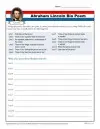
Your students will write a bio poem about Abraham Lincoln.
Bio Poem: My Mother
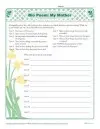
A fun Mother’s Day bio poem activity for your students!
Bio Poem: Pilgrim
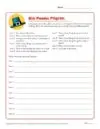
A biography poem, also called a bio poem, is a short poem which describes a person or thing. This printable Thanksgiving Activity guides students through creating a bio poem about Pilgrims.
Bio Poem: Someone You Know
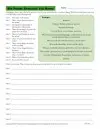
Students will write a bio poem about someone they know using the format set in this worksheet.
Christmas Tree Bio Poem
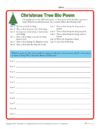
A biography poem, also called a bio poem, is a short poem which describes a person or thing. Sometimes writing a bio pem can be tricky! This printable Christmas Activity guides students through creating a bio poem about a Christmas tree.
Correct the Transition Words Mistakes – Worksheet
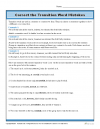
Have your students revise sentences and correct transition word mistakes with this educational writing activity.
Edgar Allan Poe: Secrets in Poetry
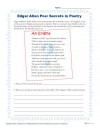
Students read from Edgar Allan Poe’s “An Enigma” and decipher the name of the woman’s whose name is hidden within the text.
Father’s Day Bio Poem: My Father
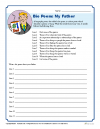
Enhance your students’ writing skills with this fun Father’s Day Biography Poem activity.
Fourth of July Bio Poem: America
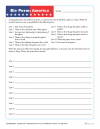
Encourage your students to learn about America with this Fourth of July Biography Poem activity.
George Washington Bio Poem
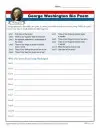
Your students will write a bio poem about George Washington.
George Washington’s List of Rules
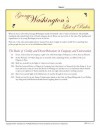
When George Washington was a young boy, he made a list of rules for himself. Students choose one of the rules and write what it means.
Halloween Bio Poem Activity: Ghost
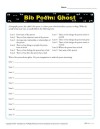
Create a bio poem about your own personal ghost with our fun Halloween printable activity!
Main Idea Organizer
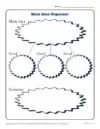
Teach your students how to organize their writing with this helpful Main Idea Organizer. Students will be asked to complete the worksheet by writing their own main idea, three details, and a summary. This will help your students better understand how to organize their ideas for writing in the future, especially when writing an essay!
Write a Biography Poem
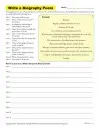
Bio poems are usually short poems following a specific format. In this worksheet students will write a bio poem about themself.
Bio Poem: A President
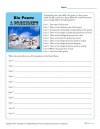
Bio poems are usually short poems following a specific format. Students will write about a President in this worksheet.
Bio Poem: An Ocean
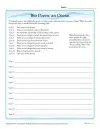
Have your students get creative by writing a bio poem about an ocean.
Editing and Proofing a Paragraph
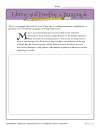
Your students will further their editing and proofing skills by correcting a paragraph in this printable classroom worksheet.
George Washington: Almost a King

What if George Washington had become king? Students ponder this question and then write about what it would be like.
How to Write a Thesis Statement
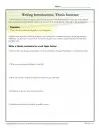
This activity helps students develop a strong thesis statement for their essays by providing practice writing sample statements.
How to Write an Introduction: Bridge Building Activity
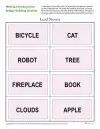
This activity is designed to help students learn about writing introductions through a fun bridge building activity to join the lead noun card and thesis statement card.
Jump to navigation
- Inside Writing
- Teacher's Guides
Student Models
- Writing Topics
- Minilessons
- Shopping Cart
- Inside Grammar
- Grammar Adventures
- CCSS Correlations
- Infographics
Student Writing Models
How do I use student models in my classroom?

When you need an example written by a student, check out our vast collection of free student models. Scroll through the list, or search for a mode of writing such as “explanatory” or “persuasive.”
Jump to . . .
Explanatory writing.
- How Much I Know About Space Explanatory Paragraph
- My Favorite Pet Explanatory Paragraph
- Sweet Spring Explanatory Paragraph
Narrative Writing
- A Happy Day Narrative Paragraph
- My Trip to Mexico Narrative Paragraph
Creative Writing
- Happy Easter Story Paragraph
- Leaf Person Story
Research Writing
- Parrots Report
- If I Were President Explanatory Paragraph
- My Dad Personal Narrative
- The Horrible Day Personal Narrative
Response to Literature
- One Great Book Book Review
- A Fable Story
- Ant Poem Poem
- The Missing Coin Story
- Winter Words Poem
- Horses Report
- Ladybugs Report
- How to Make Boiled Eggs How-To
Persuasive Writing
- Plastic, Paper, or Cloth? Persuasive Paragraph
- The Funny Dance Personal Narrative
- The Sled Run Personal Narrative
- Hello, Spring! Poem
- Cheetahs Report
Business Writing
- Dear Ms. Nathan Email
- My Favorite Place to Go Description
- My Mother Personal Essay
- Rules Personal Essay
- Shadow Fort Description
- Adopting a Pet from the Pound Editorial
- Letter to the Editor Letter to the Editor
- Ann Personal Narrative
- Grandpa, Chaz, and Me Personal Narrative
- Indy’s Life Story Personal Narrative
- Jet Bikes Personal Narrative
- The Day I Took the Spotlight Personal Narrative
- A Story of Survival Book Review
- Chloe’s Day Story
- Did You Ever Look At . . . Poem
- Dreams Poem
- I Am Attean Poem
- Sloppy Joes Poem
- The Civil War Poem
- The Haunted House Story
- The Terror of Kansas Story
- When I Was Upside Down Poem
- Deer Don’t Need to Flee to Stay Trouble-Free! Report
- Height-Challenged German Shepherd Report
- Friendship Definition
- What Really Matters News Feature
- Cheating in America Problem-Solution
- Hang Up and Drive Editorial
- Musical Arts Editorial
- Summer: 15 Days or 2 1/2 Months? Editorial
- A Cowboy's Journal Fictionalized Journal Entry
- Giving Life Personal Narrative
- The Great Paw Paw Personal Narrative
- The Racist Warehouse Personal Narrative
- Limadastrin Poem
- The Best Little Girl in the World Book Review
- How the Stars Came to Be Story
- Linden’s Library Story
- My Backyard Poem
- The Call Poem
- I Am Latvia Research Report
- Mir Pushed the Frontier of Space Research Report
- The Aloha State Research Report
- The Incredible Egg Observation Report
- Unique Wolves Research Report
- Dear Dr. Larson Email
Personal Writing
- A Lesson to Learn Journal
- Caught in the Net Definition
- From Bed Bound to Breaking Boards News Feature
- If Only They Knew Comparison-Contrast
- Save the Elephants Cause-Effect
- Student Entrepreneur Reaches for Dreams of the Sky News Feature
- Internet Plagiarism Problem-Solution
- Mosquito Madness Pet Peeve
- Anticipating the Dream Personal Narrative
- Huddling Together Personal Narrative
- H’s Hickory Chips Personal Narrative
- It’s a Boy! Personal Narrative
- My Greatest Instrument Personal Narrative
- Snapshots Personal Narrative
- Take Me to Casablanca Personal Narrative
- The Boy with Chris Pine Blue Eyes Personal Narrative
- The Climb Personal Narrative
- The House on Medford Avenue Personal Narrative
- Adam’s Train of Ghosts Music Review
- Diary of Gaspard Fictionalized Journal Entry
- My Interpretation of The Joy Luck Club Literary Analysis
- Mama’s Stitches Poem
- The KHS Press Play
- Rosa Parks Research Report
- The Killer Bean Research Report
- Mid-Project Report on History Paper Email
- Vegetarian Lunch Options at Bay High Email

COMMENTS
The length of the 8th-grade essay slightly depends on the format and the particular type of writing. However, it varies from approximately 500 to 800 words. Within this framework, you have to make yourself clear and deliver all necessary points.
Essay Writing Class 8 Format, Examples, Topics, Exercises. An essay is, generally, a piece of writing that gives the authors own argument — but the definition is vague, overlapping with those of a paper, an article, a pamphlet, and a short story. Essays have traditionally been sub-classified as formal and informal.
on October 25, 2023, 6:28 AM. Class 8 English Grammar Chapter 20 Essay Writing. An essay is a detailed piece of writing on a specific subject expressed in the required number of paragraphs. An essay usually has three parts: Introduction - This part of the essay must be short, to the point, neat and informative.
Here are some popular topics for essay writing for class 8 students: 1. The benefits and drawbacks of social media. 2. The importance of education for a successful career. 3. The impact of technology on society. 4. The effects of climate change on the environment.
The formatting guidelines for essay writing for Class 8 are as follows: Use a standard font such as Times New Roman or Arial, with a font size of 12. Use double spacing throughout the essay. Include a header on each page with the student's name, the title of the essay, and the page number.
August 31, 2022. homeworkhelp. Students. A grade 8 school student have to write many essays on different topics. Thankfully we have put together a list of 25 great essay topics to ease your task.
Question 1: You read in the newspaper about a baby girl found abandoned at the railway station. You are touched by the fact that people consider the girl child as a burden and not as an asset. Write an article for a magazine on 'Saving the Girl Child'. Take help from the hints provided. You are Neeraj Bhardwaj.
Use descriptive words to get your ideas across to the reader. Go into detail, using specific information to tell your story or make your point. Stay on track, making sure that everything you include is somehow related to the main idea of your essay. Use transitions to make your writing flow.
Verbal has a double meaning for eighth grade writing: it refers to the oral presentations the kids will do and to this year's focus on grammar — gerunds, participles, and infinitives.. Argument essays. Written in formal language, argument essays should start with an introduction that clearly presents the writer's position and flows into a well-organized, research-backed argument that ...
Grade 8 1. Types of Essays 2. The Writing Process 2.1.Pre-writing 2.2.Ordering 2.3.First written draft 2.4.Proofreading and editing 2.5.The final draft Before you even begin the writing process, you need to choose what type of essay you are going to write. 1. TYPES OF ESSAYS: TYPE PURPOSE FEATURES Narrative writing −− To tell a story.
Writing Standards: Grade 8, Standard 1 (W.8.1) Write arguments (e.g., essays, letters to the editor, advocacy speeches) to support claims with clear reasons and relevant evidence. EXAMPLE: Writing Standards: Grade 8, Standard 3 (W.8.3) Write narratives to develop experiences or events using effective literary techniques,
Grade 8 Level 4 Writing Sample. Global warming has become a serious threat to our planet. Explain what we can do as citizens to reduce the effects of global warming. You may want to consider factors, such as: recycling. the impact of fossil fuels (oil, gas and coal) the impact of consumerism (buying things). View full size.
A basic essay consists of three main parts: introduction, body, and conclusion. This basic essay format will help you to write and organize an essay. However, flexibility is important. While keeping this basic essay format in mind, let the topic and specific assignment guide the writing and organization.
oConsideration of counterarguments (what Sandel might say in response to this section of your argument) Each argument you will make in an essay will be different, but this strategy will often be a useful first step in figuring out the path of your argument. Strategy #2: Use subheadings, even if you remove themlater.
8th Grade Writing. For eighth graders, this Common Core area helps students gain mastery of writing skills by working collaboratively and producing written texts, understanding syntax and vocabulary, and organizing their ideas. Among the complete standards for this grade, eighth graders will be asked to: support the claims of their arguments ...
An essay is a focused piece of writing designed to inform or persuade. There are many different types of essay, but they are often defined in four categories: argumentative, expository, narrative, and descriptive essays. Argumentative and expository essays are focused on conveying information and making clear points, while narrative and ...
2 WRITING AND PRESENTING 4 3 Essays 6 3.1 Narrative essay 7 3.2 Descriptive essay 7 3.3 Reflective essay 8 3.4 Argumentative essay 9 3.5 Discursive essay 10 4 Longer Transactional Texts 14 4.1. Informal letter 15 4.2 Formal letter 16 4.2.1 4.2.2 Letter of application Letter to the editor (Format 1) Letter to the editor (Format 2) 16 17 18 4.3.
This sampler can be used as a resource for Florida educators, schools, and districts regarding the scoring of student responses on the B.E.S.T. Writing assessments. Each spring, students in grades 4-10 are administered a set of source texts and a writing prompt based on those sources.
These fun and interesting 8th-grade writing prompts will inspire older students to write longer and more in-depth work. Dictionary ... Essays; 100 Interesting 8th Grade Writing Prompts By Kate Miller-Wilson, B.A. , Staff Writer . Updated July 20, 2020 Image Credits.
Student Models. When you need an example written by a student, check out our vast collection of free student models. Scroll through the list, or search for a mode of writing such as "explanatory" or "persuasive.".
The purpose of these sample test materials is to orient teachers and students to the appearance of passages and prompts on paper-based accommodated. B.E.S.T. Writing tests. Each spring, students in grades 4-10 are administered one text-based writing prompt for the B.E.S.T. Writing test. Students will respond to either an expository prompt or ...
Grade 8 English Home Language Worksheet Edupstairs Grade R - 9 Learning www.edupstairs.org Writing a descriptive essay using auditory and tactile imagery ACTIVITY 1 Write a descriptive essay of approximately 250 words on ONE of the following topics: 1. The Vuvuzela: the sound of Africa 2. Little children playing in the park 3. A trophy. NOTE:
ISASP Writing . Released Writing Prompt, Sample Student Essays, and Scoring Notes . This document contains the following information: 1) A released ISASP Writing prompt that was previously administered to students in the relevant grade as part of the ISASP Language/Writing test. 2) A copy of the scoring rubric that was used to guide scoring.